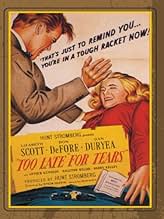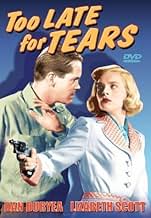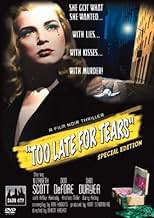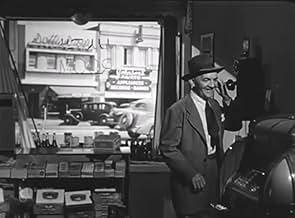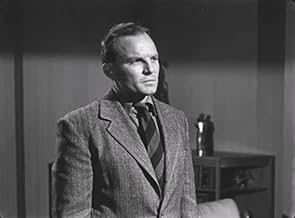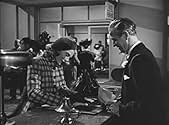ÉVALUATION IMDb
7,3/10
6,3 k
MA NOTE
Suite à un coup de chance une femme sans pitié tombe sur une valise remplie de $60.000 - elle est résolue d'y garder meme si ceci implique un meurtre.Suite à un coup de chance une femme sans pitié tombe sur une valise remplie de $60.000 - elle est résolue d'y garder meme si ceci implique un meurtre.Suite à un coup de chance une femme sans pitié tombe sur une valise remplie de $60.000 - elle est résolue d'y garder meme si ceci implique un meurtre.
- Prix
- 2 victoires au total
Jimmy Ames
- Fat Man
- (uncredited)
Georgia Backus
- Woman
- (uncredited)
Robert Bice
- Policeman
- (uncredited)
Paul Bradley
- Hotel Clerk
- (uncredited)
John Butler
- Little Man Answering Phone
- (uncredited)
David Clarke
- Jack Sharber
- (uncredited)
Jimmie Dodd
- Second Car Thief
- (uncredited)
Renee Donatt
- Young Lover in Boat
- (uncredited)
Charles Flynn
- Policeman
- (uncredited)
Billy Halop
- Boat Attendant
- (uncredited)
Richard Irving
- First Car Thief
- (uncredited)
Perry Ivins
- Checkroom Attendant
- (uncredited)
Avis en vedette
In Los Angeles, Alan Palmer (Arthur Kennedy) and his wife Jane Palmer (Lizabeth Scott) are driving to a party when a suitcase is thrown in the back seat of their car. When they open the suitcase, they find a large amount but they are chased by another car and they flee. Alan decides to deliver the money to the police, but Jane opposes and wants to keep it. So Alan decides to keep the suitcase with the money in a locker at the Union Station to decide what to do. A couple of days later, Jane spends a large amount in furs and other gifts for her. Then a man called Danny Fuller (Dan Duryea) comes to their apartment and Jane believes he is a detective and let him in; but soon she learns that he is also seeking the money. When Alan returns from his work and finds the shopping, he becomes upset and Jane does not tell anything about Danny. During the night, Alan and Jane go to a boat ride to make amends and she accidentally kills him with his pistol. Danny is forced to help her to dump the body in a lake and Jane reports to the police that her husband is missing. Her sister-in-law Kathy Palmer (Kristine Miller) that lives in the same floor snoops around Jane's apartment and finds the receipt of the locker. When she is sneaking out, she meets the stranger Don Blake (Don DeFore) that tells that is Alan's friend. Meanwhile Jane is seeking the receipt to get the money for her. Why the money was thrown to the backseat of the Palmer's convertible? Who will keep the money? Who are Danny and Don Blake?
"Too Late for Tears" is a great film with all the elements of the film- noir: there is the sordid motive, the femme fatale and many twists. This movie is probably one of the best roles of the gorgeous Lizabeth Scott. The DVD release by "Dark City" has a poor video that needs restoration. But it is worthwhile watching since the story is excellent. My vote is eight.
Title (Brazil): Not Available on DVD or Blu-Ray
"Too Late for Tears" is a great film with all the elements of the film- noir: there is the sordid motive, the femme fatale and many twists. This movie is probably one of the best roles of the gorgeous Lizabeth Scott. The DVD release by "Dark City" has a poor video that needs restoration. But it is worthwhile watching since the story is excellent. My vote is eight.
Title (Brazil): Not Available on DVD or Blu-Ray
Lizabeth Scott did her best remembered work in film noir (more than half of her only 21 screen credits fall within the noir cycle), and became one of its iconic faces. Rarely, however, was she called upon to play the fully-fledged femme fatale, and there's probably a reason for this: She couldn't bring off duplicity.
Her smile had no shadings into wry, or ironic, or smirky; it had but one setting a fresh, guileless grin that lit up like a Christmas tree. F. Scott Fitzgerald (in his sad screenwriting days) observed of Joan Crawford that you couldn't give her a simple stage direction like `telling a lie' because then she'd give an impersonation of Benedict Arnold betraying West Point to the British. But Scott can't manage even that, which results in confusingly mixed signals when her characters are motivated by malice, like Coral Chandler in Dead Reckoning: Her smile keeps convincing us that she's on the up-and-up.
Her damn smile keeps switching on in Too Late For Tears, even though there's no doubt that she's one hard, cold case. She and husband Arthur Kennedy are bickering one night en route to a party in the Hollywood Hills when suddenly a suitcase crammed with cash lands in their roadster. He wants to turn it over to the police, but she persuades him to think it over, so they check the valise at Union Station. When she starts buying clothes and furs against the checked capital, it's clear she has no intention of surrendering the windfall; we learn that her background was `white-collar poor, middle-class poor,' and that she'd made a previous marriage solely for money.
Strange men start ringing her doorbell. First Dan Duryea shows up, a blackmailer for whom the payoff was intended. He slaps her around playfully (`What do they call you besides stupid,' she taunts him. `Stupid will do if you don't bruise easily,' he purrs back). Quickly Scott maneuvers Duryea into helping him murder Kennedy but still won't tell him where the money's stashed. Though wary, he falls for her, starts hitting the bottle, and grows careless. Meanwhile, Kennedy's sister (Kristine Miller) harbors suspicions about his mysterious disappearance. When the next caller (Don DeFore) shows up, claiming to be an old Air Corps buddy of Kennedy's, she makes an alliance with him to find out what's really going on. And the claim ticket for the money keeps changing hands....
The plot is none too simple, and in consequence director Byron Haskin spends a lot of time trying to keep it clear rather than addressing some questions about character and logic that inevitably arise. Why did the avaricious, manipulative Scott marry Kennedy in the first (or second) place? Why does the sister live so conveniently close? How did Duryea, and for that matter DeFore, find Scott so easily? But few thriller plots are so tightly constructed that they survive rigorous analysis. Too Late For Tears passes muster as hard-boiled, late-40s noir and as one of Scott's hardest, strongest performances, inappropriate smile and all.
Her smile had no shadings into wry, or ironic, or smirky; it had but one setting a fresh, guileless grin that lit up like a Christmas tree. F. Scott Fitzgerald (in his sad screenwriting days) observed of Joan Crawford that you couldn't give her a simple stage direction like `telling a lie' because then she'd give an impersonation of Benedict Arnold betraying West Point to the British. But Scott can't manage even that, which results in confusingly mixed signals when her characters are motivated by malice, like Coral Chandler in Dead Reckoning: Her smile keeps convincing us that she's on the up-and-up.
Her damn smile keeps switching on in Too Late For Tears, even though there's no doubt that she's one hard, cold case. She and husband Arthur Kennedy are bickering one night en route to a party in the Hollywood Hills when suddenly a suitcase crammed with cash lands in their roadster. He wants to turn it over to the police, but she persuades him to think it over, so they check the valise at Union Station. When she starts buying clothes and furs against the checked capital, it's clear she has no intention of surrendering the windfall; we learn that her background was `white-collar poor, middle-class poor,' and that she'd made a previous marriage solely for money.
Strange men start ringing her doorbell. First Dan Duryea shows up, a blackmailer for whom the payoff was intended. He slaps her around playfully (`What do they call you besides stupid,' she taunts him. `Stupid will do if you don't bruise easily,' he purrs back). Quickly Scott maneuvers Duryea into helping him murder Kennedy but still won't tell him where the money's stashed. Though wary, he falls for her, starts hitting the bottle, and grows careless. Meanwhile, Kennedy's sister (Kristine Miller) harbors suspicions about his mysterious disappearance. When the next caller (Don DeFore) shows up, claiming to be an old Air Corps buddy of Kennedy's, she makes an alliance with him to find out what's really going on. And the claim ticket for the money keeps changing hands....
The plot is none too simple, and in consequence director Byron Haskin spends a lot of time trying to keep it clear rather than addressing some questions about character and logic that inevitably arise. Why did the avaricious, manipulative Scott marry Kennedy in the first (or second) place? Why does the sister live so conveniently close? How did Duryea, and for that matter DeFore, find Scott so easily? But few thriller plots are so tightly constructed that they survive rigorous analysis. Too Late For Tears passes muster as hard-boiled, late-40s noir and as one of Scott's hardest, strongest performances, inappropriate smile and all.
My 6th Noir in a self-managed study of Noir.
The web of deceit weaved by this crazy blond is a marvel to behold. Her brazen disregard for common sense, and the way she controls people around her, make her quite hate-worthy, which would make the actress Lizabeth Scott pleased to know.
Kristine Miller stole my heart with her grace and femininity as the innocent in-law, trying to make sense of the mad house of characters dropping in and out of her brother's apartment.
The toxic, manipulative love/hate relationship portrayed by Dan Duryea and Lizabeth Scott radiated sparks of electricity. See if *you* can figure out where that thing is headed. Only one of them can get the upper hand in this caper.
As I watched the version on Archive.org, I found myself wondering, "How are they going to wrap this up with only a few minutes to go?" knowing the clock is running out only heightens the tension of this nifty Noir.
Why aren't more people suspicious around such toxic characters? Maybe we all dread looking behind that curtain. Classic tragedy speaks to this.
This is some excellent story-telling, and is highly recommended.
The web of deceit weaved by this crazy blond is a marvel to behold. Her brazen disregard for common sense, and the way she controls people around her, make her quite hate-worthy, which would make the actress Lizabeth Scott pleased to know.
Kristine Miller stole my heart with her grace and femininity as the innocent in-law, trying to make sense of the mad house of characters dropping in and out of her brother's apartment.
The toxic, manipulative love/hate relationship portrayed by Dan Duryea and Lizabeth Scott radiated sparks of electricity. See if *you* can figure out where that thing is headed. Only one of them can get the upper hand in this caper.
As I watched the version on Archive.org, I found myself wondering, "How are they going to wrap this up with only a few minutes to go?" knowing the clock is running out only heightens the tension of this nifty Noir.
Why aren't more people suspicious around such toxic characters? Maybe we all dread looking behind that curtain. Classic tragedy speaks to this.
This is some excellent story-telling, and is highly recommended.
Byron Haskin of Arsenic and Old Lace and War of the Worlds fame teamed up with Roy Huggins to create this solid film noir entry. Huggins writing is superb for the genre - neither pretentious nor overly manic. The pace is brisk but not painfully so. And the film is very well conceived, well directed, well edited and very well acted.
The remarkable Lizabeth Scott (Jane Palmer), married to a young Arthur Kennedy (Alan Palmer), is the focus of our attention. The coupled are driving to a friend's house when a car flashes them and its occupant tosses a leather bag with 60,000 dollars into their car and drives off. Jane wants to keep it, Alan wants to turn it in. Soon, this windfall becomes a mixed blessing, as it reveals a rather frightening side of Jane's personality. The plot intertwines noir twists and turns and incessant mystery and, frequently, winds up in unanticipated places.
Lizabeth Scott is PERFECT, and really MAKES this film as much as the intriguing story and successful directing. Don Defore also turns in a notable performance as does Kristine Miller. Dan Duryea was nicely cast in his role as the heavy, but his performance here was just a sliver below his usual par.
This is very nice bit of noir cinema and will satisfy most noir fans, as well as modern crime drama aficionados. Recommended!
The remarkable Lizabeth Scott (Jane Palmer), married to a young Arthur Kennedy (Alan Palmer), is the focus of our attention. The coupled are driving to a friend's house when a car flashes them and its occupant tosses a leather bag with 60,000 dollars into their car and drives off. Jane wants to keep it, Alan wants to turn it in. Soon, this windfall becomes a mixed blessing, as it reveals a rather frightening side of Jane's personality. The plot intertwines noir twists and turns and incessant mystery and, frequently, winds up in unanticipated places.
Lizabeth Scott is PERFECT, and really MAKES this film as much as the intriguing story and successful directing. Don Defore also turns in a notable performance as does Kristine Miller. Dan Duryea was nicely cast in his role as the heavy, but his performance here was just a sliver below his usual par.
This is very nice bit of noir cinema and will satisfy most noir fans, as well as modern crime drama aficionados. Recommended!
Lizabeth Scott sinks her teeth into the role of a ruthless woman in "Too Late for Tears," also known as "Killer Bait," a 1949 film directed by Byron Haskin and written by a man who later became a very popular TV writer-director and creator of some top series, Roy Huggins.
The film also stars Dan Duryea, Don DeFore, and Arthur Kennedy.
Scott plays Jane Palmer, the wife of Alan Palmer (Kennedy) - while driving one night, someone from another car throws a satchel into their car. It turns out to be $60,000 (the equivalent of $598,000 today). Alan doesn't want anything to do with it, preferring to take it to the police, but Jane wants to keep it and spend it. Finally she convinces him to hide the money and wait for a time.
Jane, it turns out, is one tough cookie, and without giving much away, let's say that getting her hands on that money becomes her full time job, and she's determined that nothing and no one will stand in her way. Unfortunately for a few people, they stood in her way.
Really terrific noir set in Hollywood, with Dan Duryea playing a sleaze, but actually less of a sleaze than Jane - he's more of an opportunist than evil; Don Defore is friendly and unassuming as a friend of Alan Palmer's, and Arthur Kennedy, one of the finest actors in film, is just plain wasted. Perhaps this was a film he had to do in order to fulfill a contract, or it was a loanout on trade - it was a waste.
It's Scott's film, and with her husky voice, lovely smile and pouty lips, she's able to, at first anyway, hide a core of steel underneath.
Very good. If you're a fan of film noir, see this one.
The film also stars Dan Duryea, Don DeFore, and Arthur Kennedy.
Scott plays Jane Palmer, the wife of Alan Palmer (Kennedy) - while driving one night, someone from another car throws a satchel into their car. It turns out to be $60,000 (the equivalent of $598,000 today). Alan doesn't want anything to do with it, preferring to take it to the police, but Jane wants to keep it and spend it. Finally she convinces him to hide the money and wait for a time.
Jane, it turns out, is one tough cookie, and without giving much away, let's say that getting her hands on that money becomes her full time job, and she's determined that nothing and no one will stand in her way. Unfortunately for a few people, they stood in her way.
Really terrific noir set in Hollywood, with Dan Duryea playing a sleaze, but actually less of a sleaze than Jane - he's more of an opportunist than evil; Don Defore is friendly and unassuming as a friend of Alan Palmer's, and Arthur Kennedy, one of the finest actors in film, is just plain wasted. Perhaps this was a film he had to do in order to fulfill a contract, or it was a loanout on trade - it was a waste.
It's Scott's film, and with her husky voice, lovely smile and pouty lips, she's able to, at first anyway, hide a core of steel underneath.
Very good. If you're a fan of film noir, see this one.
Le saviez-vous
- AnecdotesThe UCLA Film and Television Archive has remastered Too Late for Tears (1949) from a recently discovered original print. The restoration process took five years after the print was discovered in France, and involved piecing segments of another copy into the restored version to have a complete film. The restoration was funded by the Film Noir Foundation. The restored version was broadcast on 7/17/2015, on the Turner Classic Movies network in pristine condition. The restored version of the film was released in 2016 on Blu-ray in the United States and the United Kingdom. The film has developed a cult following in the years since its release.
- GaffesJane tells Alan that the $790 she has spent represents about one tenth of a percent of the money in the satchel. Since they thought they had $100,000 (later determined by Danny the blackmailer to be $60,000). One tenth of a percent of 100,000 would be $100, so she spent closer to eight tenths of a percent of what she thought they had. A tenth of a percent of $60,000 would be $60, and $790 would be slightly over 1.3 per cent of that amount.
- Citations
Danny Fuller: Don't ever change, Tiger. I don't think I'd like you with a heart.
- ConnexionsEdited into Your Afternoon Movie: Too Late for Tears (2022)
Meilleurs choix
Connectez-vous pour évaluer et surveiller les recommandations personnalisées
- How long is Too Late for Tears?Propulsé par Alexa
Détails
- Durée1 heure 39 minutes
- Couleur
- Rapport de forme
- 1.37 : 1
Contribuer à cette page
Suggérer une modification ou ajouter du contenu manquant

Lacune principale
By what name was Too Late for Tears (1949) officially released in India in English?
Répondre

